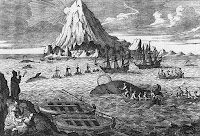July 18, not fitted for the humbugging world
 July 18—Passed within hailing of a whaler today. She confirmed the openness of the ice and stated that we should have no difficulty in the crossing if we should only catch a fair wind. For the moment it still leads us north toward Cape York.
July 18—Passed within hailing of a whaler today. She confirmed the openness of the ice and stated that we should have no difficulty in the crossing if we should only catch a fair wind. For the moment it still leads us north toward Cape York.
I wish I could convey to you a just idea of the immense stock of good feeling, good humour, and real kindliness of heart which fills our small mess. We are very happy, and our opinion of Sir John improves very much as we come to know more of him. He is anything but nervous or fidgety; in fact, I should say remarkable for energetic decisions in sudden emergencies; but I should think he might be easily persuaded where he has not already formed a strong opinion.
As you know, the rumours abounded in Admiralty circles in England that the first choice to command this expedition was James Ross, but that he turned it down because of the exhaustion he felt after four years battling the icy southern ocean on his magnificent circumnavigation of the South Polar Lands. He also harboured a quite natural desire to share time with his young wife and family. Sir John had just returned from his unhappy experiences in Van Diemen’s Land and was, I believe, anxious to undertake some action whereby he might restore his reputation, so unjustly slandered by the colonials, and escape the worries of political circumstance. He was the most senior Arctic officer available having led two extraordinary expeditions to explore the coast of America. Sir John commanded the Trent on Buchan’s attempt to reach the Pole in 1818. The only hindrance against him was his age of fifty-eight which is considered excessive by some, including a few of the junior officers on this expedition. But any grumblings have vanished. Sir John is a remarkable man and, if anyone is to lead us through this adventure, it must surely be he.
I dine with Sir John each evening the weather permits and he also enjoys the nightly company of two others from the mess. This evening I was present with Gore and Le Vesconte, and we discussed our orders.
“We must make all haste,” Sir John began, “through Lancaster Sound and Barrow Strait to Cape Walker. From there we shall set course to the southwest and sail through the uncharted waters between Banks and Victoria Lands. I hope to emerge on the coast of the Americas near Point Turnagain and from there make Behring’s Strait in good order.”
“You do not hold then,” Gore asked, “with the theory that an as yet undiscovered land fills that part of the globe?”
“I know not,” Sir John smiled. “There may be land there as you say, but it will not be of one piece—we shall find a way around it. Simpson and Dease traversed the coast almost to the foot of Prince Regent Inlet and I am confident there must be a way through to the coast, possibly several.”
“What of the northern route across the Polar Ocean?” interjected Le Vesconte. He is of the school, led by Barrow, which believes in an open ocean lying to the far north and that if only the rim of drifting pack ice around it is penetrated, a short, clear route to the Orient will be found. Like many neophytes, Le Vesconte has boundless enthusiasm for his beliefs and expounds upon them at the least provocation.
“If,” said Sir John with heavy emphasis, “after our best attempts, we find the southern route to be blocked by ice or land, then we shall turn north and try to find a way east by Wellington Channel. Our orders are very clear and we shall follow them to the best of our ability, regardless of what unsupported theories are currently in vogue in some quarters of the Admiralty.”
Poor Le Vesconte looked crushed, but said nothing more. I felt sympathy for him, but he was well aware, as are we all, how Sir John feels about Barrow’s theories. Le Vesconte was asking for a rebuff in bringing up the topic.
The fair wind continues and we are making some seven knots, good for these vessels. The sea is tolerably smooth, though we do roll a little; but this ship has the happy facility of being very steady below, though from on deck, she appears to be plunging and rolling greatly. Already we are becoming fond of the old Erebus. She is what is commonly known in the service as a ‘happy ship,’ not least the result of the cheerful community we are developing aboard her. I sometimes miss the community on land, not least the company of yourself, William and the little ones, but to belong to a band of fellows engaged as we are in one laudable purpose and confined in a small area with but the vastness of the natural world surrounding, is a situation which cannot be reproduced elsewhere. My new world fosters such joy that I cannot help but be satisfied with the life I have chosen.
I sometimes think that in any case I am not fitted for what is commonly called society—by this I mean tea and bread and butter society—and that I am much better in a position of the sort I now occupy than dallying about in the humbugging world. This is all to say that your roving brother-in-spirit is content with his lot despite only being with you in thought, which I most assuredly am. Good night.



Comments
Post a Comment